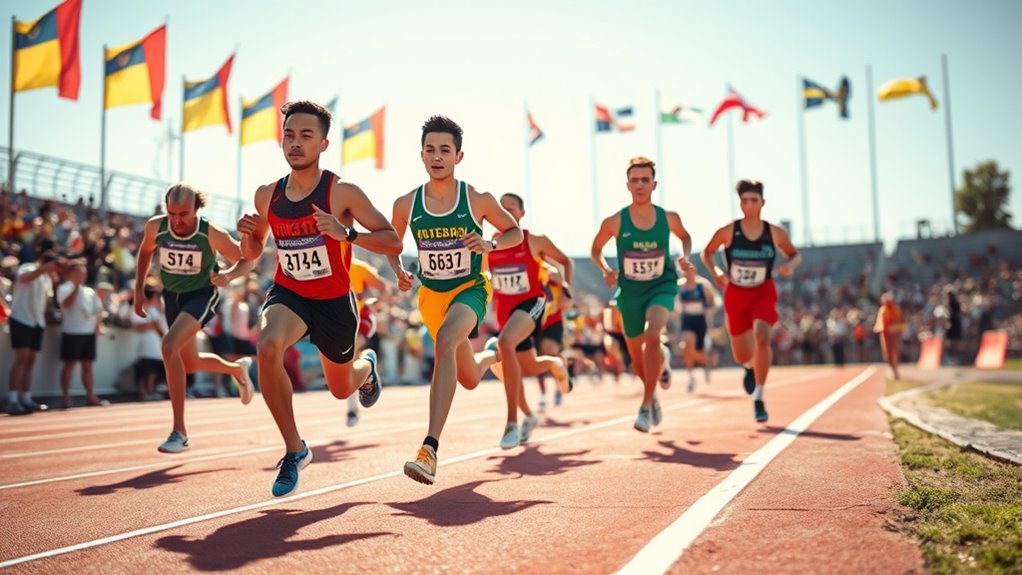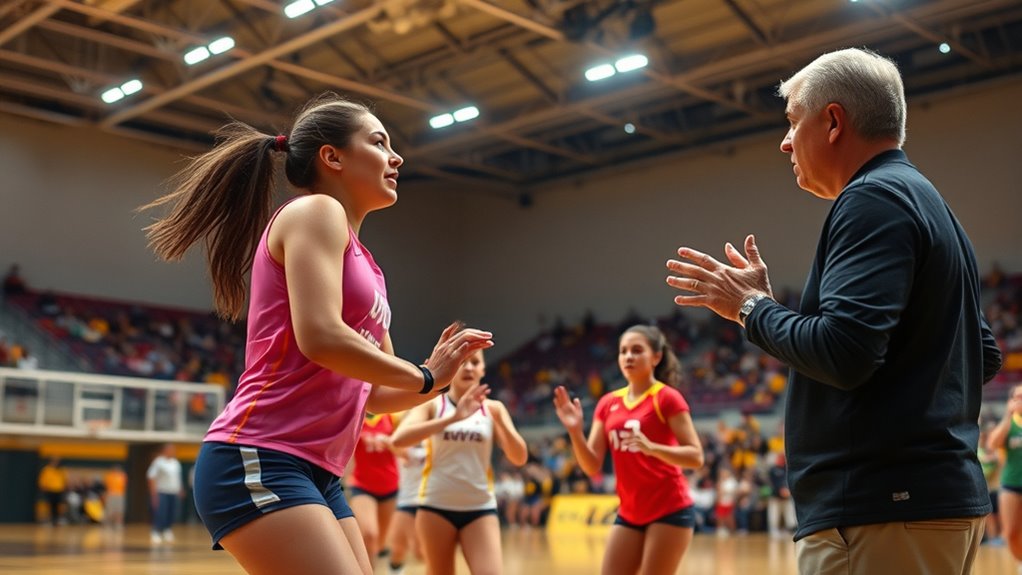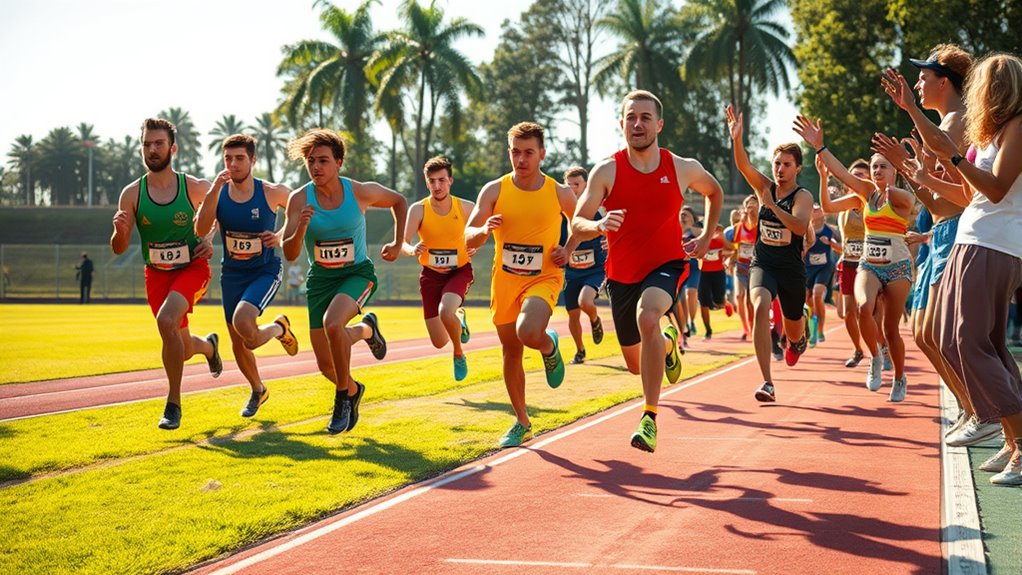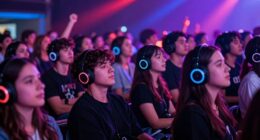Deaf athletes have made history by setting records, earning medals, and inspiring people worldwide. Pioneers started with the first Deaflympics in 1924, and since then, many have achieved extraordinary feats like Tamika Catchings’ quintuple-double and Terence Parkin’s Olympic silver. Their success stories show resilience and determination, overcoming communication barriers with innovative strategies. If you want to learn more about how these athletes break barriers and shape the future of sports, keep exploring.
Key Takeaways
- Deaf athletes have achieved historic milestones, such as Tamika Catchings’ quintuple-double and Terence Parkin’s Olympic silver medal.
- The Deaflympics, starting in 1924, foster international recognition and showcase deaf athletes’ exceptional talent.
- Notable athletes like Drew Kibler and Laurentia Tan demonstrate resilience by breaking records and winning medals globally.
- Communication adaptations like visual signals and sign language enable deaf athletes to compete at the highest levels.
- Increased global participation and technological advances promote inclusion and inspire future deaf sports pioneers.
Deaflympics sports equipment
As an affiliate, we earn on qualifying purchases.
As an affiliate, we earn on qualifying purchases.
Pioneers of the Deaflympics: Origins and Early History

The origins of the Deaflympics trace back to 1924 when the first event, known as the International Silent Games, took place in Paris. As a Deaf athlete, you should know that this event marked the beginning of organized Deaf sports and showcased the athletic talents of deaf athletes from nine European nations. High performance standards were set during these early competitions, inspiring future generations of deaf athletes worldwide. Pioneers like Eugène Rubens-Alcais, a French sports federation president, and Antoine Dresse, a Belgian athlete, played vital roles in establishing the Deaflympics. Their efforts challenged societal perceptions of deaf people as inferior and aimed to promote inclusion and awareness. The 1924 Paris Games laid the foundation of a global movement, inspiring international deaf sports organizations and initiating a tradition of quadrennial competitions. Additionally, the early success of these games demonstrated the importance of inclusive sports for fostering community and national pride among deaf populations. Recognizing the significance of athletic achievement, many deaf athletes gained recognition and broke barriers in mainstream sports. Furthermore, advancements in exclusionary attitudes have helped increase acceptance and support for deaf athletes across the world. Moreover, the development of specialized communication methods and sign languages has played a critical role in ensuring effective communication during competitions and training.

Little Signs Collection ASL First Word Flash Cards – American Sign Language Learning Cards for Beginners, Parents, Teachers & Speech Therapy, Visual Communication Training Aid
𝐒𝐭𝐫𝐮𝐜𝐭𝐮𝐫𝐞𝐝 𝐀𝐒𝐋 𝐋𝐞𝐚𝐫𝐧𝐢𝐧𝐠 𝐓𝐨𝐨𝐥: Little Signs Collection ASL flash cards are designed as a visual learning resource for…
As an affiliate, we earn on qualifying purchases.
As an affiliate, we earn on qualifying purchases.
Record-Breaking Achievements by Deaf Athletes

Deaf athletes have shattered records and achieved historic firsts that inspire us all. Their medal wins and personal bests prove that deafness isn’t a barrier to greatness. Their stories of perseverance also demonstrate how exploring market trends and embracing unique qualities can elevate their athletic careers. Additionally, their success often involves overcoming accessibility challenges, which highlights the importance of inclusive sports environments. Recognizing credit card insights in sports funding and sponsorship opportunities can further empower deaf athletes to succeed. These accomplishments highlight the incredible resilience and determination of athletes breaking new ground in sports.
Historic Firsts and Records
Throughout sports history, deaf athletes have continuously shattered records and achieved historic firsts that challenge perceptions of ability and resilience. These deaf sports pioneers have broken barriers, proving hearing impairment isn’t a limit.
Consider these inspiring milestones:
- Tamika Catchings set a record with the first quintuple-double in 1997, showcasing extraordinary versatility.
- Terence Parkin became the first deaf swimmer to win an Olympic medal, earning silver in 2000.
- Drew Kibler made history as the first deaf athlete to win an Olympic swimming medal, securing silver in 2024.
From Paralympic medals to Olympic achievements, these accomplishments inspire future generations. They highlight the incredible potential of deaf athletes, emphasizing that resilience and talent can rewrite records, challenge stereotypes, and forge new paths in sports history.
Medal-Winning Triumphs
Record-breaking achievements by deaf athletes highlight their extraordinary ability to excel on the world stage. Their medal victories showcase remarkable sports achievements and record-breaking performances. Terence Parkin’s silver in the 200-meter breaststroke at Sydney 2000 made history, and he set multiple world records in swimming. Ujlaky-Rejto Ildiko earned Olympic medals across gold, silver, and bronze, proving deaf athletes can achieve Olympic medals with perseverance. Laurentius Tan’s Paralympic success includes silver and bronze medals, demonstrating record-breaking success in para-equestrian sports. These athletes exemplify Deaf Sports’ spirit and resilience. Furthermore, understanding the managing Bitcoin volatility strategies can be crucial for athletes considering financial planning for their futures. Developing effective mental resilience techniques can help athletes overcome challenges and maintain peak performance levels amid adversity. Additionally, adopting proper training and recovery practices can optimize their performance and longevity in sports. Proper equipment maintenance is essential to ensure safety and optimal functioning of sports gear, which can also contribute to athletic success. Recognizing the importance of trust and communication can also enhance team dynamics and individual success.
Inspiring Personal Bests
Have you ever wondered how deaf athletes push beyond limits to set remarkable personal bests? Their determination and adaptation lead to record-breaking achievements that inspire us all. Consider these inspiring moments:
- Tamika Catchings became the first player to achieve a quintuple-double in 1997, showcasing her exceptional skill and dedication. Her ability to perform at such a high level demonstrates the importance of adaptive training techniques tailored to individual needs.
- Laurentia Tan has won multiple Paralympic medals, setting international records in para-equestrian dressage. Additionally, advancements in training methods and athlete support systems have further empowered deaf athletes to excel.
- Terence Parkin holds world swimming records and earned an Olympic silver medal, exemplifying perseverance.
These deaf athletes serve as powerful role models, proving that personal bests are within reach. Their stories highlight how relentless effort and resilience create lasting inspiration and redefine what’s possible in sports. Natural language processing has also played a role in advancing training methods and athlete support systems, further empowering athletes to excel.

Mindsoft Distress Flag 36" Distress PVC Flag Enhanced Visibility Water Sports Safety Watercraft Accessory for Boating Hiking Fishing Kayaking Climbing Camping
What You Get: you will receive 1 marine distress signal flag, an ideal emergency accessory for boating; This…
As an affiliate, we earn on qualifying purchases.
As an affiliate, we earn on qualifying purchases.
Inspiring Success Stories From the World Stage

You see deaf athletes breaking barriers and achieving greatness on the world stage, proving that challenges can be overcome with resilience. Their stories of success inspire others to push beyond limitations and pursue their dreams. These athletes remind us that determination and skill can lead to extraordinary accomplishments. Empowering families through supportive communities helps foster resilience and success in all areas of life. Additionally, the advancement of assistive technologies plays a crucial role in supporting deaf athletes and enhancing their training and performance. Recognizing the importance of support systems, many organizations are now focusing on creating inclusive environments that promote equity and opportunity for deaf athletes.
Overcoming Challenges Through Resilience
Despite the sensory barriers posed by deafness, many athletes turn to resilience and innovative strategies to reach the top of their sports. You see, their perseverance fuels remarkable achievements through adaptation and mental toughness. They demonstrate:
- Overcoming challenges like cerebral palsy or epilepsy, as Laurentia Tan and Terence Parkin show unwavering determination.
- Using visual cues, body language, and lip-reading to communicate under pressure, exemplified by Tamika Catchings and Derrick Coleman.
- Achieving Olympic success through innovation and perseverance, such as Ujlaky-Rejto Ildiko and Drew Kibler.
- Their stories often highlight the importance of support systems, which play a crucial role in fostering resilience and success for deaf athletes. Recognizing the significance of spiritual guidance can further enhance their mental focus and motivation. Incorporating mental training techniques can also help athletes maintain focus and composure during high-stakes competitions. Additionally, understanding adaptive strategies used by these athletes can provide valuable insights into overcoming other types of physical or sensory challenges. Furthermore, embracing inclusive training environments can empower deaf athletes to develop their skills more effectively.
These athletes embody resilience, proving that with unwavering perseverance and determination, barriers can be broken. Their stories inspire others worldwide, showing that overcoming challenges leads to extraordinary achievement.
Celebrating Deaf Athletes’ Achievements
Did you know that deaf athletes have achieved remarkable success on the world stage, proving that sensory limitations don’t define their potential? Their achievements include winning medals, setting records, and earning international recognition in disability sports.
Athletes like Tamika Catchings and Ujlaky-Rejto Ildiko showcase how perseverance and innovative communication lead to elite performance in basketball and fencing. The milestones of the first Deaflympics in 1924 marked a global celebration of deaf athletes’ talents.
Paralympic medalists such as Laurentia Tan and Michael McKillop demonstrate how overcoming physical and sensory challenges inspires others worldwide. These stories serve as powerful reminders that deaf athletes’ accomplishments aren’t just victories—they’re symbols of resilience, determination, and the inspiring spirit of disability sports.
deaf athlete training gear
As an affiliate, we earn on qualifying purchases.
As an affiliate, we earn on qualifying purchases.
Overcoming Challenges: Communication and Adaptation Strategies

Deaf athletes face unique communication challenges that require innovative strategies to succeed. You adapt by harnessing visual cues, body language, and sign language to stay connected with coaches and teammates.
To overcome auditory barriers, you develop strategies such as:
- Using light signals or vibrations to replace whistles and alarms
- Securing hearing aids with specialized equipment to prevent falling out during intense activity
- Employing visual technology like flashing lights and timers to stay aware of game timing and fouls
These adaptations enable you to communicate effectively and maintain peak performance.
Your ability to innovate, whether through visual cues or technological tools, demonstrates resilience and dedication. By embracing these strategies, you prove that success isn’t limited by hearing loss, but powered by determination and creative problem-solving.
Notable Deaf Olympians and Their Impact

Have you ever wondered how deaf athletes make a mark on the Olympic stage? Deaf Olympians like Ujlaky-Rejto Ildiko, who competed from 1960 to 1976 and won multiple medals, show that perseverance and adaptation lead to extraordinary athlete achievements.
Deaf Olympians like Ujlaky-Rejto Ildiko prove perseverance and adaptation lead to greatness.
Laurentia Tan, a deaf paralympian, earned medals at the Paralympics by feeling horse rhythms, exemplifying resilience in disability sports.
Terence Parkin set world records and won a silver medal in the 200m breaststroke, inspiring others through his success.
Curtis Pride, the first profoundly deaf Major League Baseball player, advocates for inclusive sports and visibility for deaf athletes.
Antonio Anderson’s journey from overcoming vision loss to excelling in college basketball highlights the power of determination and the broader impact of athlete achievements in deaf sports.
The Future of Deaf Sports and Inclusive Athletics

The future of deaf sports is promising as efforts to increase global participation continue to grow. With more Deaflympic member nations than ever, opportunities for athletes expand, fostering greater inclusion and representation.
As technology advances, accessibility improves through real-time captioning and visual communication tools, making sports more inclusive. Initiatives aim to integrate deaf sports into mainstream athletic programs, boosting awareness and acceptance.
Your involvement in these efforts can inspire others and promote societal change. Consider these key developments:
- Increased participation and representation of deaf athletes worldwide.
- Enhanced accessibility through innovative technological solutions.
- Broader integration of deaf sports into mainstream athletics, fostering inclusion.
Together, these strides are shaping a future where deaf athletes gain the recognition they deserve and sports become truly inclusive for all.
Frequently Asked Questions
Has There Ever Been a Deaf Professional Athlete?
You might wonder if deaf athletes have ever played professionally. The answer is yes.
For example, Curtis Pride broke barriers as the first profoundly deaf Major League Baseball player, debuting in 1993.
Tamika Catchings excelled in the WNBA despite being deaf from birth.
These athletes prove that deaf individuals can succeed at the highest levels of sports, inspiring others and showing that hearing loss doesn’t limit achievement or potential.
What Is the History of Deaf Sports?
Did you know the Deaflympics, the second-oldest international multi-sport event, started in 1924 with just nine European nations? You’re now aware that deaf sports have a rich history, beginning with pioneers like Eugène Rubens-Alcais and Antoine Dresse, who aimed to challenge societal perceptions.
Over nearly a century, these games have grown to include athletes from over 100 countries, promoting inclusion and celebrating deaf athletes’ achievements worldwide.
Who Was the First Deaf Athlete?
You’re asking who the first deaf athlete was. Eugène Rubens-Alcais holds that distinction.
He was a French deaf sports pioneer who not only competed but also helped organize the first Deaflympics in 1924.
Has a Deaf Person Ever Won an Olympic Medal?
You might wonder if a deaf person has ever won an Olympic medal. As of 2023, Terence Parkin from South Africa is the only deaf athlete to have achieved this feat, earning a silver medal in swimming at the 2000 Sydney Olympics.
While others like Ronda Jo Miller Donatucci and Antonio Anderson have competed and excelled, Parkin’s medal stands out as a historic milestone for deaf athletes in the Olympics.
Conclusion
As you explore deaf sports, you see a vibrant tapestry woven with courage, resilience, and passion. These athletes are shining stars lighting the path toward inclusivity, breaking barriers like waves crashing on a shore. Their stories inspire you to believe in the power of perseverance and unity. Just as a mosaic forms a breathtaking picture, their achievements remind us that every piece matters in creating a more inclusive and inspiring future for all.










